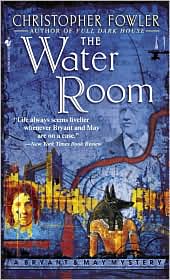
Bryant was taking tea with two of the workmen who had set up a primus stove in the hall to make their own refreshments. 'Ah, so what's the score with your cuckold? he asked. The carpenters looked at May with fresh interest. They clearly enjoyed chatting with Bryant, and had settled in so comfortably that May suspected they were hoping to drag out the work until Christmas.
'I do wish you wouldn't call him that,' snapped May, uncomfortable at having to discuss his private affairs in front of strangers. Such openness never bothered Bryant, who always behaved as if there was no one else in the room.
'I'm sorry, the situation intrigues me, that's all. You know how unlucky I've been in my own romantic affairs.'
'Oh, come one, it hasn't been all that bad. There was that girl in 1968.'
'Exactly. The only person in London who didn't have sex in 1968 was my Uncle Walter, and that was because he was in an iron lung. The trouble is, I've spent too much time on my own. I suspect I've started to behave abnormally.'
'Not at all. You've always been horrible to people.'
'That's very hurtful,' Bryant complained, attempting an emphatic response. 'Do you have any idea how alone you can feel when you think differently from everyone else?'
What Christopher Fowler is very good at is creating detailed characters. Bryant and May, the two detectives who run the Peculiar Crimes Unit in London, are beginning to get up there in years. Fowler handles with imagination and humor how their age and Bryant's trademark eccentricity will play out to give his mysteries the interest of real human beings, and the obstacles as well of the advantages of being 'different.' But why do I get the idea with this novel that Fowler is making a play for a television series? A large swathe of the first part of this novel is spent catching us up on who Bryant and May are, which I guess is to be appreciated if you have not read the excellent Full Dark House, the first Bryant and May mystery, but I have. Learning who these people are through their behavior worked through the first book and it would probably work in this one too, but Fowler seems a little less secure that those who didn't read the first book are going to have all the necessary information. The events of that mystery result in the renovation of the office of the PCU and much of the books opening 100 pages are also spent describing the inconveniences of the office renovations. I do appreciate having things fleshed out, but the amount of human interest and scenery in The Water Room has almost made the crime feel like an inconvenient detail, it's like an episode of ER when the characters romantic affairs take over and I'm wishing for a nice gurney to come in and someone to yell out a few critical stats and say 'clear!' On page 127 there is a party in the murder victim's neighborhood (it is a murder mystery after all) where I felt like the action of the mystery finally got going. The underground rivers and streams of London also figure prominently in the plot of this mystery and we're certainly getting a good deal of information on what is probably a very interesting bit of history and geography of London, but I feel like the number of jobs Fowler has given himself to do before he can cut to the chase is overwhelming the mystery, which is what I came for. Fowler is a handy and entertaining writer so I'm going to give this book a bit more time.
















No comments:
Post a Comment